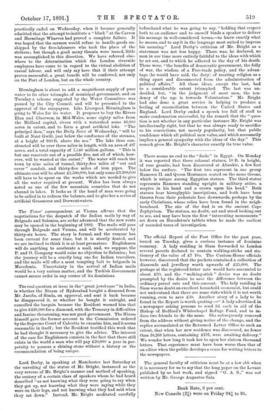Lord Derby, in speaking at Manchester last Saturday at the
unveiling of the statue of Mr. Bright, instanced as the very reverse of Mr. Bright's manner and method of speaking, the oratory of a certain class of speakers whom he had heard described " as not knowing what they were going to say when they got up, not knowing what they were saying while they were on their legs, and not knowing what they had said when they sat down." Instead, Mr. Bright meditated carefully beforehand what he was going to say, " holding that respect both to an audience and to oneself binds a speaker to deliver his message in well-considered terms,—to know exactly what he means, and to say it in the language most suited to impress his meaning." Lord Derby's criticism of Mr. Bright as a statesman was not less happy. There was, he declared, no man in our time more entirely faithful to the ideas with which he set out, and to which he adhered to the day of his death. These were, "the benefits of democratic government, the folly of war, the wisdom of a Free-trade policy, and the advan- tage (he would have said, the duty) of treating religion as a thing apart and disconnected from the administration of political affairs." All these ideas, except the last, had to a considerable extent triumphed. The last was un- decided, but, " in the judgment of most men, the ten- dency of the age is towards Voluntarism." Mr. Bright had also done a great service in helping to produce a feeling of reconciliation between the United States and England. Lord Derby ended a speech too full of stuff to make condensation successful, by the remark that the " ques- tion is not whether in any particular instance Mr. Bright was intellectually right, but that he was always ready to sacrifice to his convictions, not merely popularity, but that public confidence which all political men value, and which necessarily implies a general sympathy with the ideas of the day." This remark gives Mr. Bright's character exactly its true value.


































 Previous page
Previous page